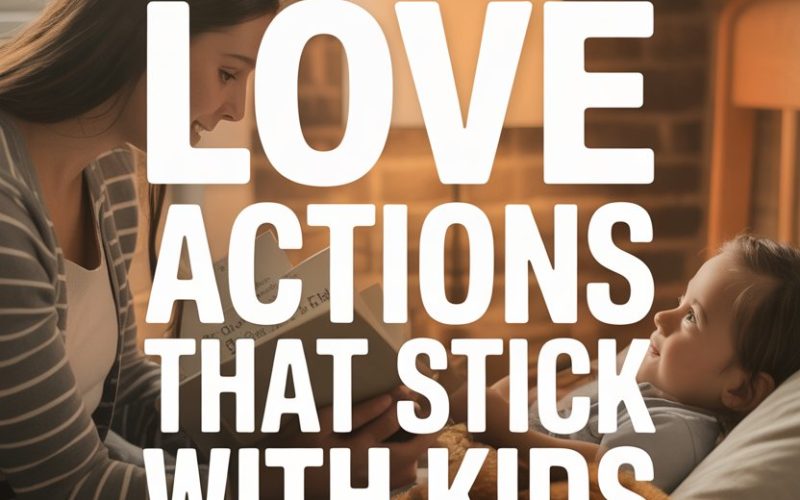Ever wonder what your child will really remember about you?
Spoiler alert: it’s not the Instagram-worthy birthday cakes or the perfectly folded socks.
Turns out, kids leave home with emotional suitcases packed full of small, loving actions—those gestures and habits that say, “Hey, you matter, even when you’re upside down and wearing your spaghetti.”
For busy parents, here’s a feel-good, doable list of 18 love actions that make a lifelong impact.
1. Say Their Name Like It’s Your Favourite Word
There’s magic in hearing your own name spoken with warmth. When you greet your child with their name—maybe even a goofy nickname—eyes light up and hearts soften.
Research shows kids who feel seen in this way develop stronger self-worth and are more likely to speak up for themselves later in life.
2. Listen With Your Whole Face
Nodding along while scrolling your phone? Kids can spot it a mile off.
Genuine listening means looking up, making eye contact, and responding to their wild tales about the class hamster’s daring escape. When children feel truly heard, their emotional vocabulary blossoms, and they grow more resilient.
3. Rituals They Can Count On
Pancake Saturdays. Silly handshakes before school. A bedtime song that makes no sense whatsoever.
These rituals become anchors. According to the American Academy of Pediatrics, routines create security and connection, especially when life gets wobbly.
4. Admit When You Mess Up
Nobody buys the Superparent act (not even your cat). Apologising when you lose your cool, forget a promise, or accidentally wear two different shoes to pick-up teaches kids that it’s okay to be imperfect. Bonus: they learn to apologise too.
5. Lunchbox Love Notes
Tucked next to the carrot sticks, a wonky heart or a scribbled “You’re brilliant” transforms an ordinary lunch into a hug from home.
Even teens secretly love these. Don’t be shocked if you find a collection of your notes years later.
6. Create an Inside Joke
Shared jokes are a secret handshake for the soul. Maybe it’s a silly phrase or a made-up song. These little nuggets of silliness become a private world, reminding your child that you “get” them—especially on rough days.
7. Give Hugs Meant for Bears
Oxytocin—the “cuddle hormone”—gets a boost with every hug. Physical affection helps kids manage stress, sleep better, and feel safe. For older kids who wriggle away, high-fives or shoulder bumps do the trick.
8. Notice Their Effort, Not Just Results
Sure, scoring a goal or acing a spelling test is great. But praising the effort, kindness, or tenacity behind the scenes is what really sticks.
Kids who hear “I saw how hard you worked on that” grow up believing they’re valued for who they are, not what they achieve.
9. Share Silly Stories From Your Childhood
Nothing earns street cred like hearing about the time you accidentally superglued your fingers together. Your willingness to be vulnerable gives kids permission to own their goof-ups too—and to laugh at life’s inevitable mess-ups.
10. Defend Them When It Counts
Standing up for your child—at the playground, in the doctor’s office, or when Uncle Gary insists she eat the green mush she hates—lets your kid know you have their back.
Children who feel protected by their parents are more likely to set boundaries and advocate for themselves as adults.
11. Let Them Interrupt (Sometimes)
Yes, manners matter. But pausing to let your child jump in with their urgent story about the world’s biggest potato sends a powerful message: Your voice matters.
Over time, this fosters open communication—even during the tricky teen years.
12. Respect Their “No”
Consent starts right at home. When your child says “no” to cheek pinching or declines a second helping, honour it.
Kids who have their boundaries respected become adults who respect others—and themselves.
13. Make Space for Their Big Feelings
Tears over the wrong-coloured cup? Meltdowns about homework? Instead of brushing it off (“You’re fine!”), try acknowledging the feeling: “That sounds really frustrating.”
This approach is backed by child psychologists and helps children learn emotional regulation.
14. Let Them Catch You Being Kind
Hold the door for someone. Say thank you to the postie. Kids are natural mimics, and when they see you treating others with respect and empathy, it becomes their default setting too.
15. Tell Them Stories About When They Were Small
“Do you remember when you used to toddle around in nothing but nappies and rain boots?” These stories become a child’s oral history—their proof that they’ve always been loved, no matter what.
16. Keep Promises (As Much As You Humanly Can)
Trust grows from consistency. If you say you’ll play a board game after dinner, try your best to follow through. Life gets in the way sometimes, but explaining why builds trust just as much as sticking to the plan.
17. Share the Tough Stuff
You don’t need to unburden your adult worries onto your child, but honesty about life’s challenges—age-appropriately—builds trust. Explaining, “Mum’s a bit grumpy today because work was hard” teaches children that feelings are normal and manageable.
18. Celebrate Their Weirdness
Every child has quirks. Maybe yours insists on wearing a superhero cape to the supermarket or can recite obscure train facts on command. Cheer them on.
The world has enough cookie-cutter expectations. Your love gives them permission to be unapologetically themselves.
Love That Leaves a Mark (In the Best Way)
Years from now, your children won’t recall every meal or perfectly planned birthday party.
What lingers are the love actions stitched into the fabric of their days—the rituals, the giggles, the moments where you chose connection over perfection.
Small gestures, repeated often, say: You belong. You are enough. You are loved beyond measure.
And that? That sticks forever.




